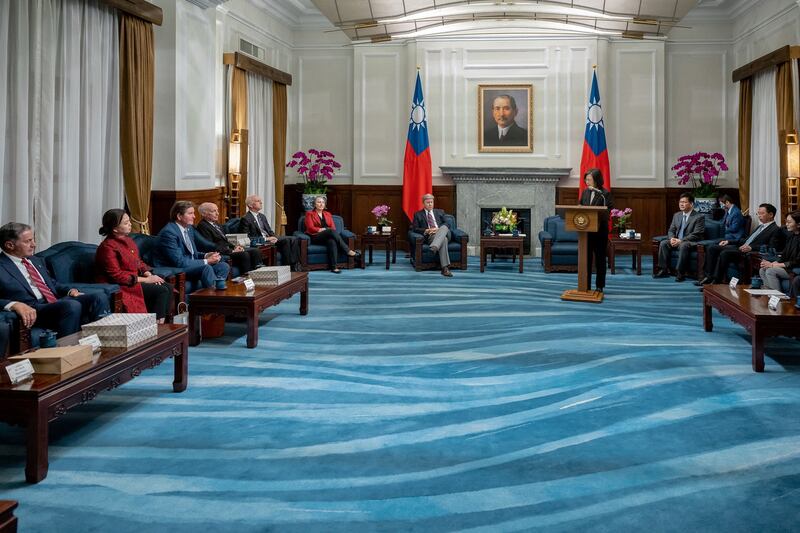Chinese-language state media was silent on Taiwan President Tsai Ing-wen's meeting with a bipartisan U.S. congress visit this week, but the English-language tabloid Global Times described the delegation as representing "hostile forces."
The state media outlet said that straight after the U.S. Secretary of State Anthony Blinken's fence-mending visit to Beijing "hostile forces and politicians within the U.S. are trying to damage the China-U.S. relationship … rather than stabilizing and managing the tense situation."
At a regular press conference on Thursday, Ministry of Foreign Affairs spokesperson Mao Ning was unwavering on China’s official response to the trip.
“There is only one China in the world, and Taiwan is an inseparable part of it,” said Mao.
“China firmly opposes any form of official exchanges between the U.S. and the Taiwanese authorities. All institutions of the U.S. government, including the executive, legislative, and judicial branches, should adhere to the diplomatic policies that the U.S. has recognized and committed to,” she said.
Mao added that the U.S. “should not send out wrong signals to the ‘Taiwan independence’ forces.”
No 'finish line’ to peace
Blinken said on Wednesday, speaking at a conference in New York, there's no "finish line" for U.S. foreign policy toward China besides maintaining peace, even if Beijing and Moscow seek to build an "illiberal" world order.
It’s a line that China is clearly not buying, maintaining that the U.S. simply wants to avoid a disastrous collision while continuing to needle the People’s Republic of China with what it calls “provocations.”
“Blinken’s trip was not to repair the damaged China-U.S. ties, but to seek communication to make sure there was no loss of control over bilateral relations,” Ni Feng, director of the Institute of American Studies of the Chinese Academy of Social Sciences, told the Global Times on Wednesday.
“It’s natural,” Ni added, “that the US is continuing its provocations and even pushing forward confrontation and decoupling in some fields.”

Speaking Wednesday to the visiting congressional delegation, Taiwan President Tsai Ing-wen said, “Deepening the security cooperation between Taiwan and the U.S. is crucial for maintaining the security of Taiwan and the Indo-Pacific region.”
According to a press release by the Presidential Office House Armed Services Committee Chairman Mike Rogers, a Republican, said that Taiwan and the U.S. share a long and important friendship based on the common values of the rule of law, democracy, and the belief in a free and open Indo-Pacific region.
Tsai described the visit as an act of protecting “the national security of the U.S. and its democratic allies.”
‘Full blown economic decoupling’
In related news, former U.S. Ambassador to the United Nations and Republican presidential hopeful Nikki Haley said on Tuesday that Washington and its allies should "give Taiwan everything it needs to defend itself," clarifying to Beijing that hostilities would mean "a full-blown economic decoupling that would massively damage China."
Beijing is “an enemy” to the U.S. and “the most dangerous opponent we have faced since World War II,” Haley said in a speech at the American Enterprise Institute in Washington.
“The Communist Party’s endgame is clear,” Haley claimed. “China is preparing its people for war. President Xi has openly said it. We should take him at his word and act accordingly.”
China hit back at Haley, reportedly saying, "Those who draw attention by smearing and blame-shifting in the election campaign will end up on the ash heap of history."
Haley’s odds in a presidential election are considered low, but observers note that her language could tip the balance in debate on the most strategically challenging power in the world for the U.S.
Meanwhile, in Taiwan the chairman of the Cross-Strait Policy Association, Stephen Tan, told RFA’s Mandarin service on Wednesday that the Armed Services Committee delegation was likely addressing the issue of delayed deliveries of weapons to Taiwan, as well as the start of military aid to Taiwan under the 2023 National Defense Authorization Act passed at the end of last year.
These are legislators who have helped enact that law, he said, adding that the bipartisan delegation was in Taiwan to help Taiwan’s leadership “understand the overall progress after the passage of the law” while also addressing “Taiwan’s concerns.”
Edited by Mike Firn.
